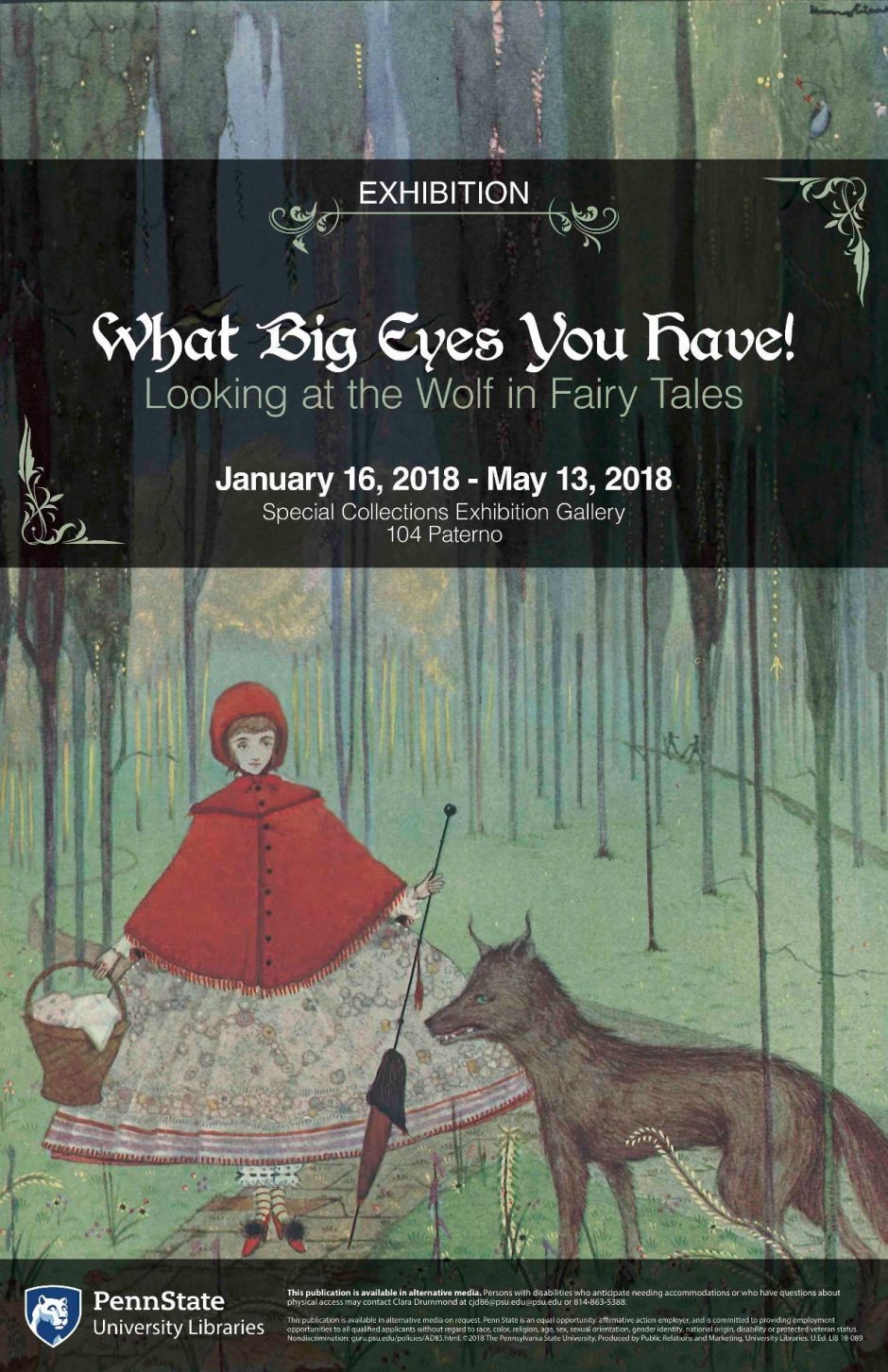Spring 2018
Academic calendar information for all campuses is available online.

Through Feb. 12: “Academic Libraries Around the World” exhibit, Diversity Studies Room, 203 Pattee Library, University Park.

MLK 2018 poster by Addie Ruston
Through Feb. 28: “Deconstructing the Dream: At Whose Expense?” student poster exhibition, Sidewater Commons, with adjacent central entrance exhibit case chronicling the life and work of King using University Libraries resources, first floor Central Pattee Library, University Park.

Jan. 16–May 13, “What Big Eyes You Have! Looking at the Wolf in Fairy Tales”exhibition, Eberly Family Special Collections Library Exhibition Room, 104 Paterno Library.
Through Feb. 8: Faculty, Staff and Student Show: A variety of works on display during library hours. John M. Lilley Library, Penn State Behrend; Free.
Wednesday, Jan. 31: Software in the Humanities and Social Sciences Workshop – Databrary, a digital data library developed at PSU for storing, sharing and annotating video and audio recordings, with Rick Gilmore . Bring a bag lunch. 403 Paterno Library, noon-1 p.m.
Tuesday, Feb. 6: The Trajectory of Document Preservation in Brazil Through the 21st Century, with Visiting Scholar Fabiana Franco Barbosa Oda. Foster Auditorium, 102 Paterno Library, 2-3 p.m. and MediaSite.
Wednesday, Feb 7: Software in the Humanities and Social Sciences Workshop – OpenRefine, a free and open-source resource for cleaning, regularizing, and organizing complex data, with Jose Guerrero. Bring a bag lunch. 403 Paterno Library, noon-1 p.m.
Wednesday, Feb. 7: Geospatial Exploration — Explore mapping and location topics and applications. An introduction to geospatial data, introductory topics of projects, data manipulation, and geoprocessing techniques. Pattee Library 211A, 3-4 p.m. and Zoom.
Wednesday, Feb. 7: Exploring Open Source GIS — QGIS. An introduction to using QGIS; Participants are encouraged to bring their laptop and if desired have QGIS installed to experience first-hand some of the software’s options. Pattee Library 211A, 4-5 p.m. and Zoom.
Wednesday, Feb 14: Software in the Humanities and Social Sciences Workshop – Upwork, a network for building and establishing a writing portfolio, with Jenna Spinelle. Bring a bag lunch. 403 Paterno Library, noon-1 p.m.
Wednesday, Feb. 14: Geospatial Online: Overview of Online mapping options. An introduction to ArcGIS Online, used to communicate spatial research interests across the disciplines. 211A Pattee Library, 3-4 p.m.
Wednesday, Feb. 14: Geospatial Analysis — Introduction to Working with location data and demographic data. An introduction to using ArcMap software to work with location data and demographic data. 211A Pattee Library, 4-5 p.m.,
Thursday, Feb. 15, 3-5 p.m. and Wednesday, Feb. 21, 5-7 p.m.: “Faster, Higher, Stronger,” A Winter Olympics Pop-up Exhibit, featuring books, materials, artifacts and memorabilia from the history of the Olympic Games. Mann Assembly Room, 102 Paterno Library.
Feb. 20: Hindi Pronunciation Workshop
Wednesday, Feb 21: Software in the Humanities and Social Sciences Workshop – QGIS, a free and open-source geographic information system for viewing, editing, and analyzing spatial data with graphical maps, with Zhiyue Xia. Bring a bag lunch. 403 Paterno Library, noon-1 p.m.
Wednesday, Feb. 21: Geospatial Data: Diving into Library Resources and beyond. 3-4 p.m., 211A Pattee Library.
Wednesday, Feb. 21: Focus on PolicyMap — Data sources and visualization options. 4-5 p.m., 211A Pattee Library.
Wednesday, Feb. 21: Mary Gaitskill 2017 Fisher Famiy Writer in Residence Foster Auditorium, 102 Paterno Library, 7:30-9 p.m.
Wednesday, Feb 28: Software in the Humanities and Social Sciences Workshop – Hadoop, a way to process very large datasets efficiently, with Juniun Yin. Bring a bag lunch. 403 Paterno Library, noon-1 p.m.
Wednesday, Mar. 7: Software in the Humanities and Social Sciences Workshop – PGP (Pretty Good Privacy), a popular program for encryption and authentication of digital messages like email, with Andrew Singer. Bring a bag lunch. 403 Paterno Library, noon-1 p.m.
Wednesday, Mar. 14: Software in the Humanities and Social Sciences Workshop – ggplot2, makes pretty, easily reproducible and modifiable graphs for publication, with Nathan Piekielek. Bring a bag lunch. 403 Paterno Library, noon-1 p.m.
Wednesday, Mar. 21: Software in the Humanities and Social Sciences Workshop – Pandoc, convert documents from one file type to another and back again, all from the command line, with Grant Wythoff. Bring a bag lunch. 403 Paterno Library, noon-1 p.m.
Tuesday, Apr. 3: Jillian Cantor to read as part of the Mary E Rolling Reading Series, Foster Auditorium, 102 Paterno Library, 7:30-9 p.m.
Wednesday, Apr. 4: Software in the Humanities and Social Sciences Workshop – IIIF, with Karen Estlund. Bring a bag lunch. 403 Paterno Library, noon-1 p.m.
Thursday, Apr. 5: Lecture by Professor Leo Bersani, “Force in Progress”. Foster Auditorium, 102 Paterno Library, 5-7 p.m.
Sunday, Apr. 22: International Write-In. Two sessions, 3:30-7:30 p.m. and 8 p.m.-midnight. Mann Assembly Room, 103 Paterno Library. Interested writers can sign up today at: http://tinyurl.com/psuwritein
Please submit event information — and all Library News submissions — to Public Relations and Marketing via the Library News submission form. *Please note: The content submissions process may be changing soon; please stay tuned for updates.*







